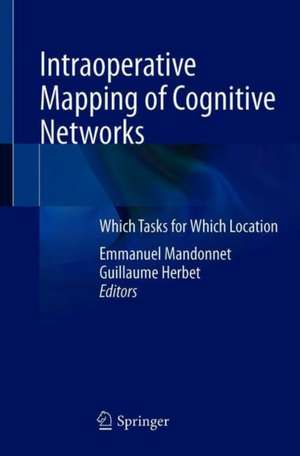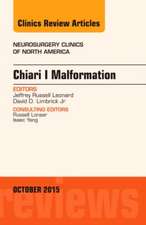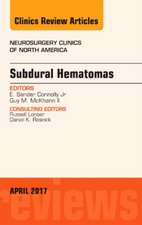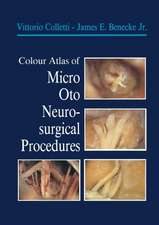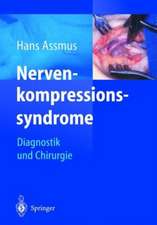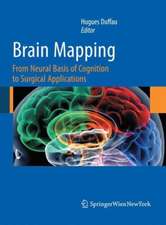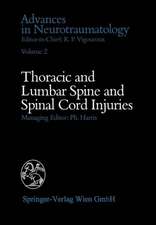Intraoperative Mapping of Cognitive Networks: Which Tasks for Which Locations
Editat de Emmanuel Mandonnet, Guillaume Herbeten Limba Engleză Hardback – 8 iul 2021
| Toate formatele și edițiile | Preț | Express |
|---|---|---|
| Paperback (1) | 723.63 lei 38-44 zile | |
| Springer International Publishing – 9 iul 2022 | 723.63 lei 38-44 zile | |
| Hardback (1) | 988.90 lei 38-44 zile | |
| Springer International Publishing – 8 iul 2021 | 988.90 lei 38-44 zile |
Preț: 988.90 lei
Preț vechi: 1040.95 lei
-5% Nou
Puncte Express: 1483
Preț estimativ în valută:
189.25€ • 205.50$ • 158.97£
189.25€ • 205.50$ • 158.97£
Carte tipărită la comandă
Livrare economică 18-24 aprilie
Preluare comenzi: 021 569.72.76
Specificații
ISBN-13: 9783030750701
ISBN-10: 3030750701
Pagini: 421
Ilustrații: XIV, 421 p. 93 illus., 90 illus. in color. With online files/update.
Dimensiuni: 155 x 235 x 28 mm
Greutate: 0.86 kg
Ediția:1st ed. 2021
Editura: Springer International Publishing
Colecția Springer
Locul publicării:Cham, Switzerland
ISBN-10: 3030750701
Pagini: 421
Ilustrații: XIV, 421 p. 93 illus., 90 illus. in color. With online files/update.
Dimensiuni: 155 x 235 x 28 mm
Greutate: 0.86 kg
Ediția:1st ed. 2021
Editura: Springer International Publishing
Colecția Springer
Locul publicării:Cham, Switzerland
Cuprins
Foreword.- Preface.- Part I: Sensorimotor and visuo-spatial functions.- 1. Motor control.- 2. Vision.- 3. FEF.- 4. Spatial cognition.- Part II: Language functions.- 5. Lexical access.- 6. Spontaneous speech.- 7. Reading.- 8. Writing.- 9. Repeating.- 10. Syntactic abilities.- 11. Verbs versus nouns naming.- 12. Verbal short-term memory.- 13. Proper names retrieval.- 14. Bilingual patients.- Part III: Higher-order functions.- 15. From verbal to non-verbal semantics.- 16. Inhibition.- 17. Set-shifting.- 18. Social cognition.- 19. Multitask mapping.- Part IV: Prospects.- 20. Creativity.- 21. Psychiatric and behavorial traits.- 22. Awake surgery in patients with poor abilities of verbal communication.- 23. Can we map inner speech?.- 24. Beyond tasks: when experience shapes intuition.
Notă biografică
Emmanuel Mandonnet is currently full Professor of neurosurgery at Lariboisière hospital, University of Paris. After achieving a PhD in physics in 2000, he turned towards medical school and then residency in neurosurgery. His clinical and research activities focus on brain tumors, and especially awake surgery of gliomas. More specifically, the aim of his work is to better predict the functional cognitive impact of surgical resections and to better understand the effect of electrical stimulations at different scales (from neurons to networks).
Guillaume Herbet is currently associate Professor of neuropsychology and cognitive neuroscience at University of Montpellier’ Department of medicine and clinical neuropsychologist at Gui de Chauliac hospital’ Department of Neurosurgery. His clinical activity is led in collaboration with Pr Duffau, and mainly aims to monitor cognitive functions of patients undergoing glioma resections in awake conditions. For almost 10 years, he developed new tasks to map the functional networks underlain by the right hemisphere, in particular with respect to emotion, social and semantic cognition. Guillaume Herbet is especially interested in better understanding the mechanistic aspects of tumor-induced neural plasticity and in disentangling the role of white tracts in cognition and behavior.
Guillaume Herbet is currently associate Professor of neuropsychology and cognitive neuroscience at University of Montpellier’ Department of medicine and clinical neuropsychologist at Gui de Chauliac hospital’ Department of Neurosurgery. His clinical activity is led in collaboration with Pr Duffau, and mainly aims to monitor cognitive functions of patients undergoing glioma resections in awake conditions. For almost 10 years, he developed new tasks to map the functional networks underlain by the right hemisphere, in particular with respect to emotion, social and semantic cognition. Guillaume Herbet is especially interested in better understanding the mechanistic aspects of tumor-induced neural plasticity and in disentangling the role of white tracts in cognition and behavior.
Textul de pe ultima copertă
This book aims to give the state-of-the-art of intraoperative brain function mapping for resection of brain tumors in awake conditions, and to become a reference for acquiring the fundamental expertise necessary to select the right intraoperative task at the right time of the surgery. The chapters, all focused on a specific brain function, are divided in 4 parts: sensori-motor and visuo-spatial functions, language functions, higher-order functions, and prospects. Each chapter follows the same outline, including a brief review of the current knowledge about the networks sustaining the function in healthy subjects, the description of the intraoperative tasks designed to monitor the function, a review of the literature describing the deficits in that function after surgery, and a critical appraisal of the benefit provided by intraoperative mapping of that function.
Caracteristici
Comprehensive state-of the-art of intraoperative brain functions testing Common approach for all chapters Each chapter is written in tandem by a neurosurgeon and a neuropsychologist
